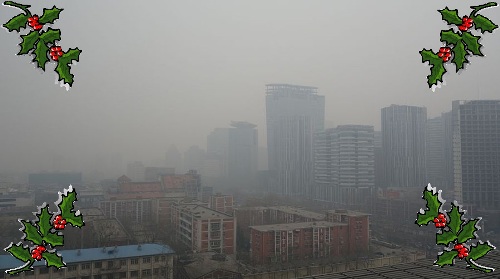
Thankfully it’s clean, clear, and snowy white out there today. However while we Beijinger’s often gripe about dismal air quality levels and unsettling recent red alert pollution restrictions, many residents of New Delhi look on with envy.
That may come as a surprise to those of us living in the Chinese capital, whose smog has become infamous in the international media, especially as of late. But for Anu Anand Hall, an American of Indian descent who works in New Delhi for the BBC world service and a young mother of two, the conditions in Beijing are comparatively quite desirable. That’s because the level of deadly PM2.5 particles is not only higher in New Delhi, according to the WHO but also because the use of air purifiers and masks is far more prevalent in Beijing.
“Masks and purifiers are extremely uncommon still,” Hall tells beijingkids in a Facebook message on Dec. 24, shortly after New Delhi recorded its most polluted day of the year. She adds: “There is growing awareness among the upper classes. Many are buying filters & masks. Some have already moved their families out of Delhi, but the vast majority of people are aware but either resigned or indifferent.”
Meanwhile, the famous anti-pollution domes erected at many schools seem futuristic and highly desirable to Delhi based parents like Hall. She says: “My son goes to the British School here. I’ve read in Beijing they have or plan to cover the playing fields with a hi-tech bubble. Here they’ve just installed a purifying system… Apart from three or four international schools who have taken imperfect measures to protect kids, other private schools are just waking up to it. And still others are in complete denial… (And) they only stop kids from playing outside when the AQI hits 250!”
She adds that the indigenous population not only lacks access and information about air purification and pollution protection; many of those locals are unfortunately all the more deprived of information: “Expats definitely use purifiers and masks more. A guy who sells purifiers here says many of his Indian customers insist purifiers will weaken the immune systems of their children.”
New Delhi’s Bubu Shinki, a New Delhi resident who frequently posts on Facebook forums about his city’s smog, says many locals are as surprised as Beijingers that the Chinese capital’s AQI gets more media attention, considering its better air quality than that of its Indian counterpart. But he says: “I realize that because of a lack of pressure from abroad, Delhi doesn’t feel the urgency to take care of it’s reputation. There is no sense of responsibility whatsoever. And maybe China wants to show the world (after Paris climate conference), that they are willing to change. As opposed to India, which is preoccupied with local nonsense.”
That lack of action frustrates parents like Hall, whose children appear to be resigned to spending their recesses indoors with no better prospects in sight. She says: “They’re essentially caged. You just can’t be outside in winter. It’s certainly making parents crazy.”
Photo: Courtesy of Wikimedia commons, pixabay.com



